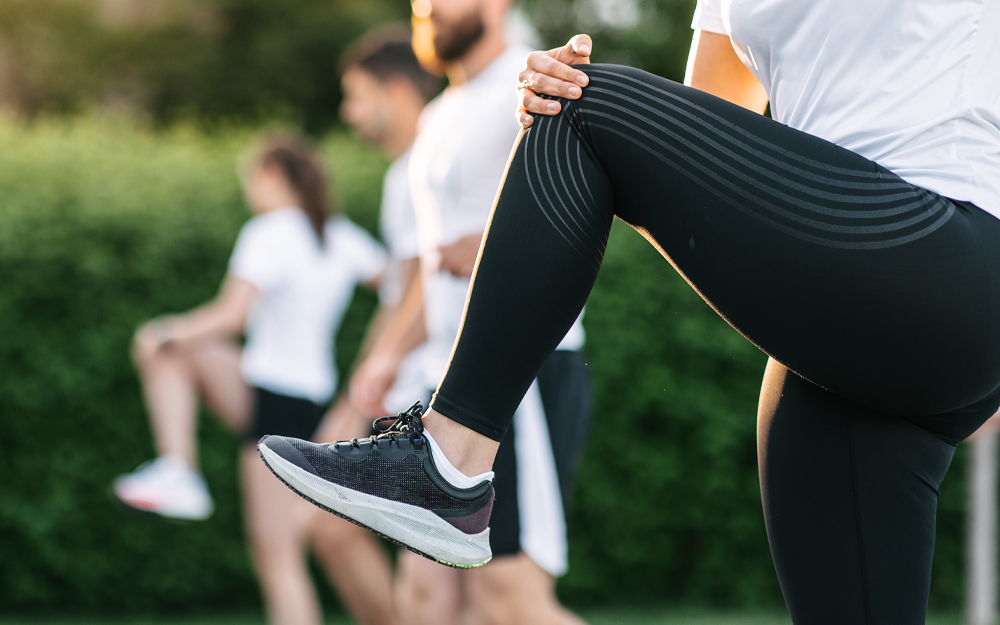Cedars-Sinai Blog
Could Running Be Good for Your Knees?
Nov 05, 2024 Christian Bordal

"How are your knees holding up?"
Runners hear this question from non-runners all the time. Running is a high-impact activity, and many people shy away from it, fearing they might damage their knees.
But recent studies challenge that narrative. They find running isn’t necessarily bad for knees; it might even be good for them.
"We do know that parts of our bodies adapt to more stress, and the patella [kneecap] cartilage is the thickest cartilage in the body because it sees the most stress."
Runners and Knee Injuries
Knees are the place where the femur, the thigh bone, connects to the shin bone, the tibia. In between them is cartilage, which acts as a shock absorber and lubricator for the bones to move against one another smoothly and painlessly.
The biggest concern people have about running is it will crush and wear away that cartilage over time.
"That’s the definition of osteoarthritis (OA), when the cartilage is completely gone, completely damaged, and it’s just bone on bone," explained orthopedic surgeon Michael Banffy, MD, team physician for the Los Angeles Rams and Dodgers. "That often ends a runner’s career."
Knee replacement surgeries for patients with OA provide only limited help, he said.
"We put a metal cap on either side of the bone with a little plastic spacer in between. But that’s really designed more for pain relief, not to allow someone to continue a high-impact activity."
Banffy said knock-kneed and bowlegged runners are especially vulnerable because they "increase wear on either the outside or the inside of the joint, and that will destroy the cartilage more quickly."
There are two other injuries, or causes of knee pain, that often afflict runners: patellofemoral pain syndrome, often called runner’s knee, and IT band friction syndrome.
"Those are usually short-term, soft-tissue injuries," said orthopedist Carlos Uquillas, MD, team physician for the Los Angeles Angels. "They can usually be alleviated by physical therapy that strengthens surrounding muscles and increases flexibility."
In fact, he and Banffy agree that for all runners, maintaining the strength and flexibility of surrounding muscles is important for knee health.
What the Studies Say About Knee Cartilage
Recent research has provided encouraging signs that running can actually bolster knee cartilage. Multiple studies have found recreational runners have a lower incidence of OA—in other words, healthier cartilage—than sedentary people.
Another study found running reduced cytokines, the proteins that cause inflammation in the knee, and helped provide knee cartilage with more of the synovial fluid that thickens it.
"The nourishment of the cartilage is directly related to motion of the joint," Banffy explained. "The synovial fluid inside the joint gets pushed into the cartilage cells with motion and with compression on the cartilage. So, some activity is important. But I don’t think running necessarily is any more advantageous than other lower-impact activities."
Uquillas’ perspective is similar.
"We know parts of our bodies adapt to more stress," he said. "And the patella [kneecap] cartilage is the thickest cartilage in the body because it sees the most stress. So, that could be part of the explanation for healthier cartilage in some runners’ knees."
But both doctors agree the jury is still out on whether running is really the direct cause of improved knee cartilage health.
"I think the research is fairly inconclusive," said Banffy. "Some people surely are genetically predisposed to better cartilage durability. That makes them more suitable to be runners. They’ll get fewer injuries."
"Runners tend to be lighter, too," added Uquillas. "And that, in itself, helps with knee health."
In addition, when it comes to arthritis, studies suggest that results vary for different types of runners. The studies show recreational runners experience arthritis less often than people who don’t run, while professional distance runners and endurance athletes are more apt to suffer from it. So, if knee cartilage adapts to the stress of running, that might be true only up to a point.
Good Reasons to Run
Running has many health benefits. It can:
- Improve cardiovascular fitness and heart health
- Maintain the health and density of bones
- Maintain a healthy weight
- Improve mood and energy levels and reduce the risk of depression
- Improve sleep
- Lower overall risk of disease and illness and extend life expectancy, as with most forms of exercise
If you decide to take up running, the doctors agree you should build up slowly, beginning with short runs and stretching before and after. Some strength training will also reduce the chance of injury.



